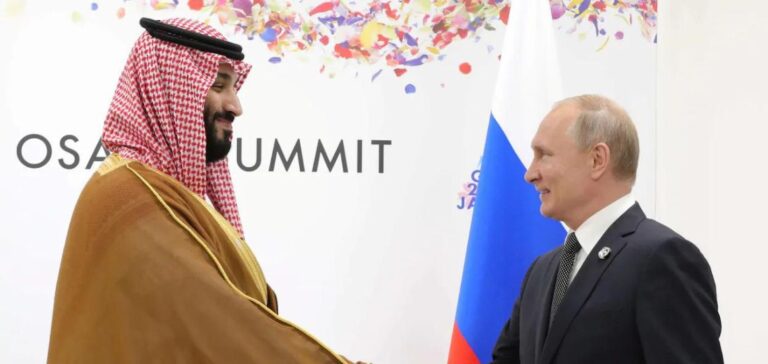Saudi Arabia and Russia, two of the world’s largest oil producers, reiterated their commitment to maintaining close coordination within OPEC+ to ensure energy market stability. In a phone call, Saudi Crown Prince Mohammed bin Salman and Russian President Vladimir Putin stressed the importance of this strategic alliance. This cooperation aims to maintain the production cuts needed to balance the market and support oil prices.
Since the start of the year, the 22-member OPEC+ has implemented production cuts of 5.86 million barrels per day (b/d). These measures have contributed to a rise in prices, although they remain below the levels needed to balance the budgets of many members. On August 1, the OPEC+ Joint Ministerial Monitoring Committee will meet to assess market conditions and make recommendations on production policy.
Geopolitical challenges and sanctions
The relationship between Saudi Arabia and Russia is particularly significant in the context of Russia’s invasion of Ukraine. This situation has considerably altered world oil flows and subjected Moscow to severe sanctions from Western countries. Despite these challenges, Russia continued to produce oil, often exceeding the quotas set by OPEC+.
In June, Russian production reached 9.10 million b/d, its lowest level since December 2020, but still above its quota. This situation obliges Russia to make “compensatory reductions” to comply with the OPEC+ agreements. The Russian Ministry of Energy has indicated that technical reasons make it easier to reduce production during the summer months.
Impact on exports and prices
Russia’s crude oil exports fell to 2.9 million b/d in the first half of July, the lowest level since December 2022. This drop is due to the return to service of refineries damaged by Ukrainian drone attacks and the new European Union (EU) sanctions against Russia. The reduction in exports could also be attributed to Russia’s commitments to comply with OPEC+ production agreements.
Despite these efforts, oil prices remain volatile. Dated Brent was valued at $86.20/b on July 17, up 13.5% on the 2024 low, but still below the levels needed for many OPEC+ members. OPEC+ production cuts have certainly tightened the market, but compliance problems persist, particularly for countries such as Iraq and Kazakhstan, which are also exceeding their quotas.
Future prospects and challenges
Cooperation between Saudi Arabia and Russia within OPEC+ remains crucial to the future of the global oil market. As the West continues to exert pressure on Russia through sanctions, the dynamics within OPEC+ could be decisive for oil price stability. The assessment of the market situation at the next OPEC+ meeting will be crucial in determining the alliance’s future strategy.
OPEC+’s ability to maintain strict production discipline and navigate a complex geopolitical context will be key to ensuring the stability of the global energy market. The ongoing interactions between Riyadh and Moscow and their commitment to OPEC+ illustrate the complexity and importance of strategic alliances in the energy sector.





















